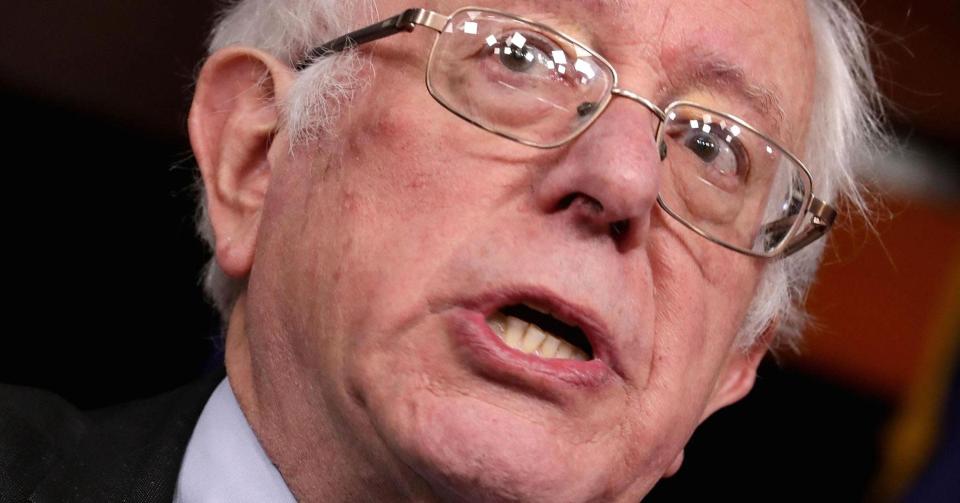Op-Ed: Why Big Pharma should be afraid. Very afraid

Bernie Sanders is upset. But after a fascinating vote in the U.S. Senate Wednesday night, it's Big Pharma that should be upset. In fact Big Pharma should be afraid. Because for the second time this week it's becoming obvious its iron wall of protection in Washington is starting to crumble.
On the surface, the drug companies won a battle against Senator Bernie Sanders as his bill to allow pharmaceutical distributors and pharmacists to import cheaper prescription drugs from Canada and other countries lost by a narrow 52-46 vote. And Sanders is fuming at the 13 Democratic Senators who essentially killed the bill by voting against it.
But first impressions can be deceiving. The bigger news is that 12 Republicans joined the Sanders forces and voted in favor of his bill. Suddenly, the battle lines in the pharma wars are shifting. They didn't shift in time to get this cheaper drug importation bill passed, but that measure was small potatoes anyway. The stakes will be much higher in the coming months, and the anti-pharma armies are getting stronger.
Just look at some of the names of the key GOP Senators with seniority or national renown as conservatives who voted in favor: Ted Cruz, (yes THAT Ted Cruz), Charles Grassley, John Thune, John McCain, Jeff Flake, and Mike Lee. And note well that the newest Republican Senator, John Kennedy from Louisiana, also joined in favor. More on Kennedy, and why his vote was especially telling in a moment.
But first, it's hard to discount the importance of seeing Senators like Cruz and Thune join in on a bill clearly meant to send a message to the drug industry. This is very much the result of more and more bi-partisan opposition to exploding prescription drug prices in individual cases like Mylan's EpiPen last year and the Martin Shkreli-induced 50-fold increase for a life-saving drug called Daraprim in 2015. And while Democrats and Republicans joined in the drug company-bashing and drug company CEO-bashing in response to those incidents during Senate hearings, actually standing up and being counted in a vote meant to warn the entire drug industry is more significant.
Of course, this is not just a result of the EpiPen costs and Martin Shkreli. This new party-line crossing trend has a lot to do with the new sheriff coming to the White House next week. President-elect Donald Trump sent drug sector stocks into a tailspin earlier this week when he made a special point of calling out the drug companies for "getting away with murder" in their pricing power.
The fact that he made that statement the very morning before the Sanders bill vote in the Senate is significant and it's likely it may have influenced a few Republican Senators who had been on the fence. And, getting back to the freshman Senator Kennedy from Louisiana, it was probably not lost on the man who received the most personal campaign support from Trump in 2016 that the incoming president and his most important political benefactor decided to hit Big Pharma so prominently that same day.
This drug pricing war is indeed producing very different battle lines. So let's also look at the names of some of the 13 Democrats who opposed Sanders' plan, because those names are also very telling. Democrats like Corey Booker and Bob Menendez, both from Big Pharma's major U.S. headquarters state of New Jersey, voted "nay." The drug industry's major presence in states like Delaware and Pennsylvania also seems to have played a roll in getting the two Democratic Senators from Delaware and the one Democrat from Pennsylvania to vote no as well. And so did Democrat Patty Murray from Washington, who is one of the biggest recipients of pharma company donations with almost $300,000 for her re-election campaign last year alone.
Despite those Democratic Party defections from the progressive base on this vote, there's not going to be enough campaign money and corporate headquarter arrangements in blue states to overcome the tide that's turning against the drug industry right now. With that 52-46 tally, all the forces against Big Pharma's current pricing power need is four more votes and a little more time to finish what they started Wednesday night. A few more tweets or phone calls from Trump ought to do the trick, especially if his message is backed up by people like Senator Cruz along with Sanders and Senator Elizabeth Warren.
Well, we all said we wanted more bipartisanship in Washington. Or at least we wanted more issues to be free of the predictable party line dichotomy every time. It turns out what did the trick wasn't so much an issue or an entity to support, but a punching bag. By relying too much on lobbyists and political donations, Big Pharma walked right into that trap. And the incoming president and a surprising number of Democrats and Republicans on Capitol Hill are winding up to deliver a big blow.
Commentary by Jake Novak, CNBC.com senior columnist. Follow him on Twitter @jakejakeny.
For more insight from CNBC contributors, follow @CNBCopinion on Twitter.
More From CNBC
Top News and Analysis
Latest News Video
Personal Finance

